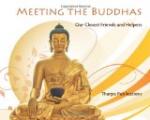Robert laughed merrily. “That is the funniest thing I ever saw a hen do!”
“I never before had one that would get into my lap,” said Mrs. Spencer, “though my hens often eat out of my hand.”
“I thought hens were too stupid to care for any one,” said Robert.
“I believe it is possible to win the affection of any creature we have under our care,” said Mrs. Spencer.
[Illustration: A happy family.]
How to feed and care for hens.
“Do you give meat to the hens?” asked Robert.
“They do not need meat in summer,” said Mrs. Spencer, “because they catch bugs and grasshoppers. In the winter, if it seems to be necessary, it is possible to buy animal food that is prepared for the purpose.
“I give them potato peelings, or small potatoes mixed with some kind of meal, and in winter I always warm their food before I give it to them. A very good supper is whole grain, but in the morning it is better to give them soft food.
“They must have lime in some shape to form the eggshells. I give my hens burnt oyster shells, pounded fine, or clam shells. All the year they need some kind of green food; if they do not have this they are very likely to be sick.”
“What do you mean by giving them green food?” asked Robert. “You cannot get grass in winter.”
“That is true,” said Mrs. Spencer, “but you can give them cabbage, which they like very much, or cooked vegetables. In the spring and summer they will enjoy the fresh clover. When they are allowed to have free range, they eat grasshoppers and crickets and do not need meat.
“All fowls must have some kind of grit with their grain food. Crushed stone, which can be bought, will supply this need. Fowls must have clean straw for their nests, and dry earth and plaster or lime must be put on the floor of the hen-house under the roosts. It is important also to sprinkle dry sulphur in the nests once in a while, to keep insects away.
“They like dry earth for their dust bath. Did you ever see a hen lying down in the dust, and throwing it all over herself? She enjoys this just as much as you enjoy going into the salt water, and she needs it as much as you need your bath.”
“I should think a hen would find it hard to know her own chickens.”
“Oh, no! The youngest chicken knows the voice of its mother, and the mother can tell the difference between the cry of her chickens and the voices of those which do not belong to her.
“It is interesting, also, to watch the rooster care for the hens. When he finds something particularly good, he calls them all around him, and often he will not eat a morsel until he sees that they are satisfied.
“Of course there are greedy roosters sometimes, as well as greedy boys and girls, but usually the rooster is good to the hens.
“Some thoughtless farmers carry live fowls with their heads hanging down. This is very cruel. Think how you would like being carried in that way. It is cruel also to crowd them into little hampers when they have to be carried to market.




